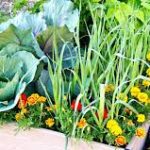Monthly Meetings
The club has monthly public meetings for nine months of the year on the second Thursday of the month with presentations from experts on gardening, a plant raffle and refreshments. Meetings are at Burlingame Hall, 252 W Spain St, Sonoma, CA 95476.
Time: 6:30 PM – Meet & Greet | 7:00 PM – Talks Begin.
New Members: Download Application
Current Members, Pay Your Annual Dues
The Valley of the Moon Garden Club annual dues are due January 1st, 2025. Please pay $30 by check payable to VOMGC: PO. Box 124, Sonoma, CA 95476.
Upcoming:
Evergreen & Moonbeam Holiday Party, Members only
Thursday December 11, 5:30 pm
Burlingame Hall @ 1st Congregational Church 252 W. Spain Street Sonoma
$50 per person: Member, Spouse, Partner, or One(1) Other Guest-(two total-$100)
CASH or CHECK must be received by November 21*: (No payment will be taken@door or after Nov 21 as Caterer needs exact headcount)
Mailto POBox124 Sonoma,Ca95476
orDropoffinsecureMailboxofJaySmith's @698Broadway
RSVP is required to TeddyPender:347-968-1648 or theop52@hotmail.com
COSTUMESRecommendedascontest!!!
NOCorkageFee,Bringyourfavorite vino to share!!! AND Please bring another bottle of wine to ADD to table for the GRAND Live AuctionItem
Please indicate if Vegetarian
Previous Meetings and Events
AUG 14: Ron Wellander, Landscape Architect & Vice Mayor, City of Sonoma
June 12 – Cory O’Gorman: Ethnobotany and Land Stewardship in a World of Wildfire
This highly relevant and practical presentation will provide a brief overview of ethnobotanical knowledge and how it informs contemporary land stewardship, particularly in California’s fire-adapted landscapes. The talk will offer information on and practical strategies for wildfire preparedness, defensible space management, home hardening, and ecological land stewardship techniques that protect both people
and ecosystems.
Cory holds a Master’s degree in Plant Biology from Sonoma State University, where his collaborative research with the Native Advisory Council at Pepperwood Preserve was published in Ecology and Society. He has worked across diverse ecosystems ranging from hardwood forests to coastal prairie, and in 2024, co-founded ECOS Land Services, an ecological land stewardship business focused on wildfire preparedness, invasive species management, and sustainable land care.
In addition to his academic work, Cory has experience in native plant propagation, firefighting (certified Firefighter Type 2), permaculture design, landscape construction, milling, woodworking, and farming. He has also conducted ethnobotanical research in British Columbia and brings a broad and thoughtful perspective to land management and stewardship. Cory is fluent in Spanish and currently learning both Portuguese and Irish.
May 8 – Kerry Wininger, Educational Outreach & Communications Lead, Center for Environmental Inquiry (CEI), SSU Citizen Science and the Sudden Oak Death (SOD) Blitz.
Kerry discussed how community action is fighting a forest epidemic and protecting Northern California’s biodiversity (SOD Blitz weekend likely May 2-11)
VOMGC Spring Plant Sale: April 26
Flowers, Ornamentals, Veggies, Herbs, Natives, Succulents and much more….
February 13, 2025 – The Hidden Language of Plants in Art with Craig Griffeath.
Craig Griffeath, local art historian, explores how plants have served as symbols of communication throughout history. Discover the fascinating backstories and meanings of plants in art, literature, and culture—from ancient Rome to the present.
March 13, 2025 – Propagation Methods & Habitat Restoration, From Nursery to Nature with Vincent "V" Distrola.
Vincent “V” Distrola, Nursery Technician at Point Blue Conservation Science, discusses techniques for growing and restoring native plants. With hands-on examples, he’ll demonstrate how native species are cultivated.
April 10 – Alaric Balibrera, Founder and Director of Rainforest Risingx
Restoring Pollinator Habitat with Hi-Tech: Drones, Seedballs, and Large-Scale Regeneration: Alaric will share how new technology—like drones and seedballs—is being used to restore critical habitat for monarch butterflies and other pollinators.
January 9, 2025 – Restoration of Jack London’s Historic Orchard
Eric Metz, Director of Operations for Jack London Park, shares the fascinating story of assessing, stabilizing, and restoring Jack London’s century-old orchard. Learn how this historic orchard has been rejuvenated into a thriving community resource, preserving Jack London’s farming legacy.
November 7th, 2024: California Wildflowers throughout the Decades: Rob Badger & Nita Winter
The presenters are internationally acclaimed conservation photographers. Badger and Winter will share their adventure photography of California’s wildflowers through the decades.
The duo began photographing California’s blooms in 1992 at the Mojave Desert’s Antelope Valley Poppy Preserve. This led to their award-winning documentary art project, “Beauty and the Beast: Wildflowers and Climate Change.”
Fall Plant Sale: Saturday October 19th, 9am- noon
17805 Arnold Drive, Sonoma, CA 95476
Veggies, Herbs, Flowers, Ornamentals, Natives, Succulents, and much more….
March 7th, 2024:Lisa Willett
Cultivating the “Crop” of Local Economy
In an era when we can have almost anything in the world delivered to our doorstep overnight, the idea of buying local has become more novel, and less convenient, but Lisa Willett would like to tell you why it’s important.
The Valley of the Moon Garden Club is hosting Willett, the owner of Community Supply, a local general store that prioritizes vendors and products from our area, at its Thursday March 7th meeting. Lisa was the owner of Yoga Community for 13 years. She shifted the focus of her retail shop to the Community Supply concept in 2019. Her goal is to cultivate local economy and support small makers by providing shelf space for handmade products and items that are sustainably produced or utilize ingredients grown or made in our area. Lisa is excited to share her passion for community and introduce some of the items her store carries and highlights. The VOMGC welcomes members of the community to attend Lisa’s presentation.
This month’s raffle will include some locally produced items from Lisa’s shop. Please join us.
Previous Meetings and Events
Feb 1, Ellyn Mavalwalla,The Seedy Side of Gardening
Ellyn is the manager of The Seed Bank in Petaluma. Her(self-proclaimed) “black thumb” turned green after something “just clicked” in 2006 and her garden began to thrive. She took a part time job at the Baker Creek Heirloom Seeds store in Connecticut that blossomed into her opening a garden shop in 2014.
In 2016 Ellyn moved to Petaluma and has been managing the Seed Bank ever since. Ellyn holds three Master Gardener badges, has an addiction to gardening books, and is a passionate educator to both new and experienced gardeners.
Don’t miss this opportunity to get your
questions answered and confidently start your Spring seedlings.
January 4th, 2024: Jennifer Gates, Climate Change Action Plan
Jennifer Gates is the City of Sonoma's Community Development Director. She will discuss what Sonoma is doing as a city to fight climate change.
Jennifer will outline the Climate Change Community Action Plan, its progress to date, projected impact, and tips and tricks we can use in our gardens and homes to further this cause.
November Meeting: Garden Club Roundtable
- Is it a good practice to trim roses with a weedwhacker?Dennis gave a definitive “no” and noted roses should be pruned between 1/3 and 1/2 of the plant’s size. Adrienne shared the “3 leaves” rule of thumb on dead-heading, Ted countered with 5 leaves.
- Is cardboard good for weed control?Lots of feedback on this topic and Bonnie’s method of cardboard and 2-3” of mulch before the rains seemed like a consensus. And you can plant right through it. Nadya recommended 6” overlaps on the cardboard to prevent weeds creeping through.
- Is hair a good deer repellent?
Not sure if we got a definitive on this one, but Dennis said deer don’t like smells from meat-eaters, so there could be merit to the theory. Priscila has had success using Irish Spring soap in the yard to deter deer.
The rest of the meeting mainly consisted of topics presented by members, and here are some highlights:
- If you would like an appraisal of your garden’s fire-readiness, Claudia recommended Adapt Sonoma CountyAdapt Sonoma County – they will come out for a free assessment.
- Ted recommended dipping cuttings in honey before planting to improve your propagation success.
- Linda Sherman wisely starts her winter garden while its still warm, usually in September, to get better starts to plant as November comes.
- For that winter garden, these seemed to be favorites:Beets, Carrots, Broccoli, Cauliflower, and Fava Beans. You can also go to a nursery and see what they are selling as winter arrives.
- Speaking of Fava Beans (was a big topic) there was discussion if harvesting the beans cuts down on the beneficial nitrogen effects; Dennis said it does to some small degree, and Susan’s answer is to only harvest the beans from every other plant.
- Two other options for winter cover crops were pre-mixed seed packages either Sonoma Mission Gardens nursery or LeBallister’s Seed & Fertilizer in Santa Rosa, although Michele recommended buying enough to feed the birds if you use this method.
- There was a good discussion on frost prevention, with watering well before a cold-spell, and using frost control blankets as the main helpful practices. Incandescent lights are still available to help warm your citrus trees through the winter
- For the best timing to trim perennials, Twink strongly recommended that it is best to have the plants look ugly through the winter and clean them up in spring when you see re-growth the following year. Plus it help protect plants from cold spells, and gives habitat to beneficial critters.
- Google Lens got some nods to help identify plants using the camera on your smart phone, but can also be helpful identifying problems like leaf curl, etc.
- When moles and gophers came up Helaine said she uses Marigolds to help keep them away, although there was discussion of buying coyote pee online (gotta love Amazon sometimes).
- Dennis had a good rule-of-thumb for citrus: let it be a tree and not a bush. Cutting the lowest branches will ensure you get the fruit you want and help prevent the root stock from taking over.
October 5 Meeting: Biochar
”Biochar is a specialized form of charcoal that is produced by heating biomass using high heat (typically 350 C to 1000 C) in low-oxygen environments, and that is suitable for use in agriculture. It is commonly used as a soil amendment (typically combined with compost) to increase soil health, conserve and store nutrients and water, and in many cases increase agricultural crop yields.
Researchers are also discovering many other uses for biochar, including stormwater filtration, as a feed supplement in dairy and poultry operations, and even as a beneficial additive in concrete production and construction materials.”
https://sonomabiocharinitiative.org/about-biochar/
Fall Plant Sale: October 7th: 9 am - noon
Altimira Middle School, 17805 Arnold Drive, just north of Boyes Boulevard, in Sonoma.
Buy winter vegetable plants, herbs, flowering annuals that over-winter, perennial plants that will bloom in spring, succulents, bulbs, and starts from club members’ gardens, all at reduced prices.
Cash or checks are accepted. Proceeds from the sale benefit all of Sonoma Valley’s school gardens, the Monarch Pollinator Garden in Sonoma, a high school scholarship and public presentations with gardening information and related topics.
July 6th Summer Picnic, Sonoma Garden Park
Enjoy the beautiful gardens on your self-guided tour!
July 4th on the Sonoma Plaza
2023 Parade Winners:
PAST- Sonoma Community Center
PRESENT- Valley of the Moon Gardening Club
FUTURE- Sonoma Jr Dragons Football & Cheer
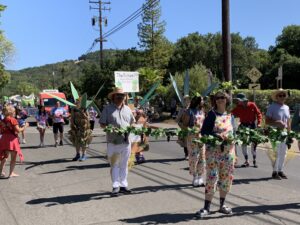
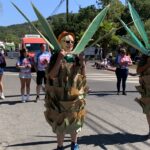
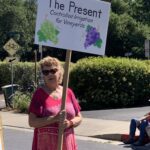
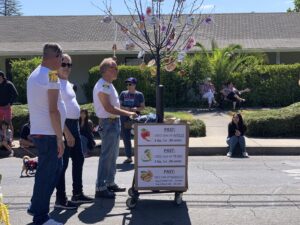
June Meeting: Thursday June 1, 7 pm
We Love Bees! Amazing Insects Continue to Fascinate
Will Ackley: My bee company name is Wild Will’s Honey. I have 16 years’ experience in beekeeping, bee rescue, including removal of bees from buildings and other structures. I process and make candles from my hives’ wax. My current inspiration is studying Apitherapy also known as bee sting venom therapy. I desire to cultivate a deep connection to these amazing insects which have earned my respect and compassion. I am committed to community outreach on behalf of the bees and their beekeepers. I am helping and wishing everyone to succeed in their beekeeping journey.
Nadya Clark:
I came to beekeeping from gardening, after noticing a surprising lack of honeybees in my garden. I started from ground zero after receiving three swarms in one month from Angelo Illbeto of Angelo’s Meats. That was over a decade ago of mistakes and triumphs. I volunteered for ten years as Librarian for Sonoma County Beekeepers Association. Beekeeping changes how
one sees the world. There is a flow to the seasons, and an enhanced awareness of the web of life that surrounds us. I am listed on the SCBA Swarm list for Sonoma Valley, to respond when a swarm of bees appears in your yard! This Spring alone I have collected over a dozen swarms.
Spring Plant Sale: Saturday, May 13th
April Meeting: Making Kombucha at Home, Michele Taylor-Smith
Kombucha is a fermented drink that has grown in popularity over the last couple of years and can now be seen on restaurant menus and taking over whole sections of the grocery store. Part of its popularity comes from many people’s belief that it improves digestion, increases energy, improves the immune system, along with other positive health effects. The other reason? … people like the taste. It can be a bit expensive to buy, ranging from a few dollars a bottle up to $5-6+ a glass. However, homebrewers make it for less than 25 cents a serving. And it isn’t that difficult.
Michele Taylor-Smith will present the “who, what, where, why and how” of kombucha. An active member of the Vom Garden Club, Michele has been making her own kombucha for several years using fruits from her garden (and the store) for flavoring, including plum, persimmon, fuzzy (peach/orange) and more. Join us for this intro to kombucha, try a sample, ask some questions, and walk away with the basics to decide if making this tasty treat is right for you.
March Meeting: Dennis Przybycien: Pictorial Vineyard Tour![]()
Living in Sonoma we are lucky to be just minutes away from country roads, open space, and agricultural land. For those of us who enjoy wine, the sight of green rows of grape vines is a pleasure. Some may not see it that way, but to me vineyards are a sustainable and viable crop in Sonoma, and is preferable to urban sprawl.
As a Master Gardener, I often get questions about what is going on in the vineyards, I would like to take you on a tour of our valley and point out some of the Spring activities that are required to keep the vines healthy and productive. Join me at the March VOMCG meeting for a pictorial tour of our vineyards.
February Meeting:
Tom Pickford, What Makes an Orchid an Orchid![]()
![]()
After retiring from the Maritime and Wastewater industries, I started growing Orchids 12 years ago when I inherited 12 plants from a dear friend after she passed. My “collection” now numbers approximately 1000 which goes to show Orchids do have an addictive quality. In addition to growing Orchids, I am active in several Orchid Societies and am a fully Accredited Orchid Judge in the American Orchid Society.
Orchids are the second most populous and one of the most highly evolved plant families in the world with over 35,000 known individual species and more 350,000 hybrids.
Most people think Orchids are hard to grow, to keep alive and to rebloom. I love to help folks understand that this is not in fact the case.
I will give a basic hands-on talk on what makes an Orchid an Orchid, how to be successful in growing, reblooming, and repotting them.
January Meeting: January 5th
![]()
![]()
![]() Scot Medbury:Sonoma Botanical Garden
Scot Medbury:Sonoma Botanical Garden
Sonoma Botanical Garden (formerly Quarryhill Botanical Garden) Executive Director Scot Medbury will share the history and emerging vision for the future of this Sonoma Valley treasure, which has recently opened a new California flora section of its 67-acre property. A new program of indoor horticultural exhibitions is also currently being held in its large greenhouse with a current feature on citrus, “From East to Zest,” running through March 5th, 2023. The garden is located in north Sonoma Valley, near Glen Ellen. website: sonomabg.org.In 1968, San Francisco resident Jane Davenport Jansen purchased forty-plus acres with an abandoned sandstone quarry.In 1987, she sponsored the first plant collecting expedition to Asia. It has now become home to one of the largest collections of scientifically documented, wild-source Asian plants in North America and Europe.Scot Medbury has been involved in the curation, cultivation, and interpretation of botanical collections for 40 years, having held appointments at gardens in New York, Washington state, Hawai’i, Great Britain, and New Zealand, in addition to earlier postings in California. Mr. Medbury is president emeritus of Brooklyn Botanic Garden, and previously was the director of both the San Francisco Botanical Garden and the San Francisco Conservatory of Flowers, where he oversaw a historic restoration that returned the Conservatory to one of that city’s key attractions.
Thursday. October 6th, 7 pm
Rachel Alexander, a member of the California Academy of Sciences in San Francisco’s Golden Gate Park's
Fall Plant Sale: fun event. Here are some photos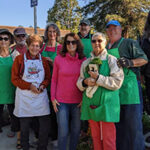
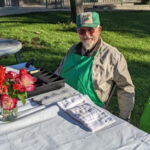
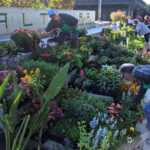
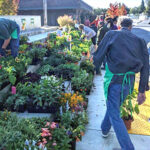
Proceeds from the sale benefit a high school scholarship, the Sonoma Valley school and community gardens, and the Monarch Pollinator Garden in Sonoma.
October Meeting: Rooftop Gardening
Thursday. October 6th, 7 pm
Rachel Alexander, a member of the California Academy of Sciences in San Francisco’s Golden Gate Park's Landscape and Horticulture team, will discuss the Academy’s rooftop garden project and the grounds around the museum that she works on. Alexander feels honored to care for the academy’s living roof, and to share her knowledge about supporting local habitats and pollination with the Sonoma community.
September Meeting: Farmers Market, modified
Thursday. September 1st, 7 pm
Harvest time in Wine Country means that we get to celebrate the bounty from our gardens and the wineries are harvesting the grapes. We thought it would be a fun idea to share veggies, fruit or flowers with the members at our September meeting. Sort of a “Farmer’s Market” only no money will be exchanged, just bartering. There will be no speaker in September, however, we welcome our members to share ideas on their successful garden.
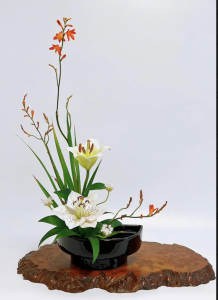 August Meeting: Dori Araujo
August Meeting: Dori Araujo
Create your own Ikebana Arrangement
Thursday. August 4th, 7 pm
 Dori Araujo is our guest speaker for our August 4th meeting at Burlingame Hall, our usual meeting place.
Dori Araujo is our guest speaker for our August 4th meeting at Burlingame Hall, our usual meeting place.
Dori has been a floral designer for 55 years. She is now retired and living in Sonoma. She’s worked in flower shops in Hawaii, Texas, New Jersey, Tennessee and Florida. She’s also worked in Canada.
Dori's love of Ikebana began with a neighbor of hers in Hawaii. She was still in high school and she was their babysitter. Dori went to their home one evening and she had the most beautiful arrangement on her entry table. It took her breath away! She asked about it and was told it was Ikebana, Japanese floral arranging. The neighbor was a master instructor and offered to teach her. Dori has been to many schools ofIkebana since then. She belonged to Ikebana International for several years and still follows the different disciplines. While she loves traditional flower arranging, Ikebana is her passion and she is looking forward to sharing that with you.
Dori will demonstrate one tall and one low, following Ikebana traditions.
June Meeting: Bonnie Brown
A Pollinator Garden with Little Water
Thursday. June 2th, 7 pm
The June 2 meeting of the Valley of the Moon Garden Club will feature a visual presentation on making beautiful flowering gardens as nectar sources for pollinators using minimal water. Flower gardens needn’t be large, expansive places to be beneficial to nature or enjoyable for people. Pots on a patio or a wildflower meadow all make a big contribution to pollinators. Water-wise techniques make it possible.
Having a swath of nectar gardens throughout Sonoma Valley and County, where butterflies, bees, birds, and other pollinators can find food, shelter, and nesting habitat will increase their ability to thrive. This is all the more important in an agricultural area that has a single crop that pollinators cannot use and has taken up their native habitat. One third of all food and drink that humans consume must be pollinated by insects, which are in a steep decline because of pesticides and habitat loss. Every pollinator garden matters.
Types of plants, such as natives, cultivars, heirlooms, annuals, and perennials will be clarified, with photos and a list of best plants for pollinators. Gardening tips from Master Gardeners and tricks from old farmers will be peppered throughout the presentation by the speaker, Bonnie Brown. She is a 24 year Sonoma Valley organic gardener, has been president and VP of the Valley of the Moon Garden Club, and is co-manager of the Monarch Pollinator Garden, a public demonstration garden in the town of Sonoma.
May Meeting: Dennis Przybycien, Watering Recommendations During Drought Restrictions
Thursday. May 5th, 7 pm
Due to our Mediterranean climate, frequent drought conditions, and perhaps climate change we will be required to reduce our water use. Our landscape is a place where we can easily reduce water usage from 20 to 40%. This presentation provides recommendations to conserve water in our vegetable gardens, lawns, shrubs, and trees.
Many of us have converted our irrigations systems to automated drip systems. Hints are presented to optimize these systems to adequately, but not overwater our gardens.
The garden water meter is described as a useful tool to help understand your plant water requirements
Dennis Przybycien: Biography
My wife Olga and I have been members of the Valley of the Moon Garden Club since we moved to Sonoma more than 20 years ago. For three years I served as the President of the club.
My background is:
- Retired research chemist for Kaiser Aluminum and Chemical Corp.
- Earned an AA degree in ornamental horticulture
- A member of the Sonoma Master Gardeners since 2009
- I planted and maintained a vineyard, orchard, vegetable garden, and ornamental garden on a large property in the Diamond A district on Sonoma Mountain. We have since sold that property, and moved into an urban home in Sonoma, and have been modifying the garden to be water-wise.
Spring Plant Sale
Saturday April 23, 9 AM-Noon
Altimira Middle School
17805 Arnold Drive, Sonoma, CA
The Spring Plant Sale is held outdoors at Altimira Middle School on Arnold Drive, just south of Boyes Boulevard, Sonoma. Please enter at the south end of the circle drive. Cash and checks only.
Vegetable starts, flowering plants, and succulents are sold in 4” pots at very reasonable prices. Garden club members will have plants taken from their gardens to offer also, some bushes and trees.
Proceeds from the sale will benefit Sonoma Valley school gardens and a high school scholarship.
The club has donated gardening books to school libraries, supplies all school gardens with plants, has given a food preserving class, established the Tranquil Garden at Sonoma Valley Hospital, continually maintains the Sassarini School garden, and has donated to Larsen Park Garden.
April Meeting: Wendy Krupnick, Organic and Carbon Gardening.
Thursday. April 7th, 7 pm
For the vaccinated, masks are not required, however, if you feel more comfortable you may, of course, wear one.
Wendy Krupnick bio: http://www.igrowsonoma.org/author-bios/
March Meeting: Steven Sando of Rancho Gordo, Your Pals in the Bean Business
Thursday. March 3rd
For the vaccinated, masks are not required, however, if you feel more comfortable you may, of course, wear one. If unvaccinated, please wear a mask.
Rancho Gordo has led the revival of interest in Heirloom Beans. From growing the best and most interesting beans available, to making sure all crops are fresh and a pleasure to cook with, to providing you with great instructions, recipes and tips here on our website, on our blog and most importantly, through our bi-monthly email newsletter, we want you to make the best beans. There are no excuses for bad beans when it's so easy to make a rich, delicious pot of creamy goodness.
January Meeting: Earth Care Alliance
Thursday. January 6th
Virginia Bertelsen of the Sonoma FCC Earth Care Alliance will join us to introduce some of the pilot program they offered this year given by the founder, Pat Cane PhD., of Capacitar International.
”Capacitar Self-Care Practices to Accompany Youth and Other Climate Activists in Our Climate Emergency”.
The Earth Care Alliance will tell us the story of Capacitar’s mission to “ Heal Ourselves, is to Heal the World” by their teaching simple movements of body and mind wellness practices.
Earth Care trained members with the work of Capacitar will lead us into some of these simple practices that have been proven to help manage stress, improve mental focus, strength, and resilience ...critical tools in this time of climate emergency.
Capacitar International is a nonprofit organization founded 35 years ago, and is working in 40 different countries around the world. It is located in Soquel, California.
CAPACITAR’S (WWW.CAPACITAR.ORG) MISSION IS TO "HEAL OURSELVES AND HEAL THE WORLD” The name Capacitar means to awaken and encourage.
Contact person from the Earth Care Alliance is Virginia Bertelsen vbertelsen13@gmail.com.
Also here is a Link to a 20 min. Video telling the story of Capacitar.
https://www.youtube.com/watch?v=8czUAIUFeRM
Paul Martinez: Sonoma Valley Wholesale Nursery
Thursday. November 4th
Social time beginning at 6:30 pm, with presentation to start at 7 pm
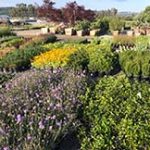
Paul Martinez is an industry iconoclast whose passion for growing plants was sparked by his mother at a very early age.
His love for horticulture is grounded by a deep respect and amazement for the environment and its potential to adapt. Before “sustainable” became a buzzword, he cultivated plants free of pesticides, herbicides and fungicides for PDM Landscape which was the ornamental landscape installation, maintenance and construction company he founded in the 1980’s. During his forty years of experience in applying that trade all over Sonoma and Napa Valleys he became convinced that organic and sustainable practices go hand in hand.
It was a lack of reasonably priced locally sourced landscape plants grown organically that inspired Paul to start Sonoma Valley Wholesale Nursery (SVWN). His vision for the nursery had been a long held dream and come into being in 2009. At SVWN Paul mixes up certified organic potting soils to grow plants in containers. The nursery’s focus on sustainability demands the discipline necessary to cultivate plants that will translate to the customer’s native environments better than any other container-grown plan material. “I spend an inordinate amount of time in the field observing plants in various stages of growth” says Martinez. Paul believes that the quality of every in- ground landscape is observed five years after planting.
Paul strives to share his knowledge with like- minded gardeners which is why we are fortunate to have him be with us. He will bring handouts and some plants to share. Please visit his very impressive website and look at the posted video: www.sonomavalleynursery.com.
Past Events
Autumn Plant Sale
Water-Wise Plants • Succulents • Vegetables • Perennials • Annuals
Saturday - October 9, 2021, 9:00 AM - Noon
Altimira Middle School
17805 Arnold Drive, Sonoma, CA
October is prime time to plant perennials and winter vegetables while the soil is still warm and sunlight is good. Annuals can be added to the garden to fill spaces where other plants have faded from their summer growth.
Proceeds from the sale benefit a high school scholarship, Sonoma Valley school and community gardens, and the Monarch Pollinator Garden in Sonoma.
Pay by cash or check
COVID PROTOCOL • WEAR A MASK • KEEP 6 FOOT DISTANCE
October Meeting: Pollinators: The Little Ones That Run the World
Thursday. October 7th
Social time beginning at 6:30 pm, with presentation to start at 7 pm
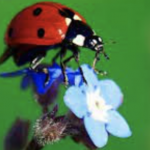 One third of the food people eat is made possible by small insects that carry pollen from one flower to another flower of the same type of plant. If flowers do not receive pollen, the result is that fruit, nuts, grains, and vegetables cannot grow. In addition to the human diet, fruits and seeds derived from insect pollination are a major part of the diet of approximately 25% of all birds, and of mammals ranging from small herbivores to grizzly bears.
One third of the food people eat is made possible by small insects that carry pollen from one flower to another flower of the same type of plant. If flowers do not receive pollen, the result is that fruit, nuts, grains, and vegetables cannot grow. In addition to the human diet, fruits and seeds derived from insect pollination are a major part of the diet of approximately 25% of all birds, and of mammals ranging from small herbivores to grizzly bears.
The garden managers of the Monarch Pollinator Garden in Sonoma will show how each person can help these essential creatures to thrive, with beautiful visuals of the garden and pollinators. Their mission is to create a swath of healthy pollinator gardens and landscaping throughout Sonoma Valley.
Water Efficient Practices with Brandon Steiner of the Valley of the Moon Water District
Thursday. August 5th
Social time beginning at 6:30 pm, with presentation to start at 7 pm
252 W. Spain St.Sonoma, CA
Brandon Steiner has been a Water System Operator II with the Valley of the Moon Water District (VOMWD) since 2016.
On July 8th, 2021, the VOMWD issued this press release:
"Valley of the Moon Water District Board Declares Stage Two Water Shortage" which included specific restrictions/prohibitions with which we must comply. The district has been led to move from voluntary conservation to mandatory water use restrictions.
Brandon will provide basic information and also answer questions about individual needs and circumstances.
As a viable and well connected club, we've always been aware of the importance of wise water usage. However, the current restrictions make it a good time to revisit and renew our watering goals to keep our gardens growing well in spite of the current water challenge. Check out their website: www.vomwd.org
Monthly Meetings
The club has monthly public meetings for nine months of the year on the first Thursday of the month with presentations from experts on gardening, a plant raffle and refreshments. Meetings are at Burlingame Hall, 252 W Spain St, Sonoma, CA 95476.
Current Members, Pay Your Annual Dues
The Valley of the Moon Garden Club annual dues were due January 1st, 2022. Please pay $25 by check payable to VOMGC: PO. Box 501, Vineburg, CA 95487.
New Members: click to join the Valley of the Moon Garden Club
March Meeting: March 2nd, 7 pm
Dennis Przybycien: Pictorial Vineyard Tour
![]()
![]()
Living in Sonoma we are lucky to be just minutes away from country roads, open space, and agricultural land. For those of us who enjoy wine, the sight of green rows of grape vines is a pleasure. Some may not see it that way, but to me vineyards are a sustainable and viable crop in Sonoma, and is preferrable to urban sprawl.
As a Master Gardener, I often get questions about what is going on in the vineyards, I would like to take you on a tour of our valley and point out some of the Spring activities that are required to keep the vines healthy and productive. Join me at the March VOMCG meeting for a pictorial tour of our vineyards
Happy Backyard Gardening, Dennis Przybycien
Previous Meetings and Events
February Meeting:
Tom Pickford, What Makes an Orchid an Orchid![]()
![]()
After retiring from the Maritime and Wastewater industries, I started growing Orchids 12 years ago when I inherited 12 plants from a dear friend after she passed. My “collection” now numbers approximately 1000 which goes to show Orchids do have an addictive quality. In addition to growing Orchids, I am active in several Orchid Societies and am a fully Accredited Orchid Judge in the American Orchid Society.
Orchids are the second most populous and one of the most highly evolved plant families in the world with over 35,000 known individual species and more 350,000 hybrids.
Most people think Orchids are hard to grow, to keep alive and to rebloom. I love to help folks understand that this is not in fact the case.
I will give a basic hands-on talk on what makes an Orchid an Orchid, how to be successful in growing, reblooming, and repotting them.
January Meeting: January 5th
![]()
![]()
![]() Scot Medbury:Sonoma Botanical Garden
Scot Medbury:Sonoma Botanical Garden
Sonoma Botanical Garden (formerly Quarryhill Botanical Garden) Executive Director Scot Medbury will share the history and emerging vision for the future of this Sonoma Valley treasure, which has recently opened a new California flora section of its 67-acre property. A new program of indoor horticultural exhibitions is also currently being held in its large greenhouse with a current feature on citrus, “From East to Zest,” running through March 5th, 2023. The garden is located in north Sonoma Valley, near Glen Ellen. website: sonomabg.org.In 1968, San Francisco resident Jane Davenport Jansen purchased forty-plus acres with an abandoned sandstone quarry.In 1987, she sponsored the first plant collecting expedition to Asia. It has now become home to one of the largest collections of scientifically documented, wild-source Asian plants in North America and Europe.Scot Medbury has been involved in the curation, cultivation, and interpretation of botanical collections for 40 years, having held appointments at gardens in New York, Washington state, Hawai’i, Great Britain, and New Zealand, in addition to earlier postings in California. Mr. Medbury is president emeritus of Brooklyn Botanic Garden, and previously was the director of both the San Francisco Botanical Garden and the San Francisco Conservatory of Flowers, where he oversaw a historic restoration that returned the Conservatory to one of that city’s key attractions.
Thursday. October 6th, 7 pm
Rachel Alexander, a member of the California Academy of Sciences in San Francisco’s Golden Gate Park's
Fall Plant Sale: fun event. Here are some photos



Proceeds from the sale benefit a high school scholarship, the Sonoma Valley school and community gardens, and the Monarch Pollinator Garden in Sonoma.
October Meeting: Rooftop Gardening
Thursday. October 6th, 7 pm
Rachel Alexander, a member of the California Academy of Sciences in San Francisco’s Golden Gate Park's Landscape and Horticulture team, will discuss the Academy’s rooftop garden project and the grounds around the museum that she works on. Alexander feels honored to care for the academy’s living roof, and to share her knowledge about supporting local habitats and pollination with the Sonoma community.
September Meeting: Farmers Market, modified
Thursday. September 1st, 7 pm
Harvest time in Wine Country means that we get to celebrate the bounty from our gardens and the wineries are harvesting the grapes. We thought it would be a fun idea to share veggies, fruit or flowers with the members at our September meeting. Sort of a “Farmer’s Market” only no money will be exchanged, just bartering. There will be no speaker in September, however, we welcome our members to share ideas on their successful garden.
 August Meeting: Dori Araujo
August Meeting: Dori Araujo
Create your own Ikebana Arrangement
Thursday. August 4th, 7 pm
 Dori Araujo is our guest speaker for our August 4th meeting at Burlingame Hall, our usual meeting place.
Dori Araujo is our guest speaker for our August 4th meeting at Burlingame Hall, our usual meeting place.
Dori has been a floral designer for 55 years. She is now retired and living in Sonoma. She’s worked in flower shops in Hawaii, Texas, New Jersey, Tennessee and Florida. She’s also worked in Canada.
Dori's love of Ikebana began with a neighbor of hers in Hawaii. She was still in high school and she was their babysitter. Dori went to their home one evening and she had the most beautiful arrangement on her entry table. It took her breath away! She asked about it and was told it was Ikebana, Japanese floral arranging. The neighbor was a master instructor and offered to teach her. Dori has been to many schools ofIkebana since then. She belonged to Ikebana International for several years and still follows the different disciplines. While she loves traditional flower arranging, Ikebana is her passion and she is looking forward to sharing that with you.
Dori will demonstrate one tall and one low, following Ikebana traditions.
June Meeting: Bonnie Brown
A Pollinator Garden with Little Water
Thursday. June 2th, 7 pm
The June 2 meeting of the Valley of the Moon Garden Club will feature a visual presentation on making beautiful flowering gardens as nectar sources for pollinators using minimal water. Flower gardens needn’t be large, expansive places to be beneficial to nature or enjoyable for people. Pots on a patio or a wildflower meadow all make a big contribution to pollinators. Water-wise techniques make it possible.
Having a swath of nectar gardens throughout Sonoma Valley and County, where butterflies, bees, birds, and other pollinators can find food, shelter, and nesting habitat will increase their ability to thrive. This is all the more important in an agricultural area that has a single crop that pollinators cannot use and has taken up their native habitat. One third of all food and drink that humans consume must be pollinated by insects, which are in a steep decline because of pesticides and habitat loss. Every pollinator garden matters.
Types of plants, such as natives, cultivars, heirlooms, annuals, and perennials will be clarified, with photos and a list of best plants for pollinators. Gardening tips from Master Gardeners and tricks from old farmers will be peppered throughout the presentation by the speaker, Bonnie Brown. She is a 24 year Sonoma Valley organic gardener, has been president and VP of the Valley of the Moon Garden Club, and is co-manager of the Monarch Pollinator Garden, a public demonstration garden in the town of Sonoma.
May Meeting: Dennis Przybycien, Watering Recommendations During Drought Restrictions
Thursday. May 5th, 7 pm
Due to our Mediterranean climate, frequent drought conditions, and perhaps climate change we will be required to reduce our water use. Our landscape is a place where we can easily reduce water usage from 20 to 40%. This presentation provides recommendations to conserve water in our vegetable gardens, lawns, shrubs, and trees.
Many of us have converted our irrigations systems to automated drip systems. Hints are presented to optimize these systems to adequately, but not overwater our gardens.
The garden water meter is described as a useful tool to help understand your plant water requirements
Dennis Przybycien: Biography
My wife Olga and I have been members of the Valley of the Moon Garden Club since we moved to Sonoma more than 20 years ago. For three years I served as the President of the club.
My background is:
- Retired research chemist for Kaiser Aluminum and Chemical Corp.
- Earned an AA degree in ornamental horticulture
- A member of the Sonoma Master Gardeners since 2009
- I planted and maintained a vineyard, orchard, vegetable garden, and ornamental garden on a large property in the Diamond A district on Sonoma Mountain. We have since sold that property, and moved into an urban home in Sonoma, and have been modifying the garden to be water-wise.
Spring Plant Sale
Saturday April 23, 9 AM-Noon
Altimira Middle School
17805 Arnold Drive, Sonoma, CA
The Spring Plant Sale is held outdoors at Altimira Middle School on Arnold Drive, just south of Boyes Boulevard, Sonoma. Please enter at the south end of the circle drive. Cash and checks only.
Vegetable starts, flowering plants, and succulents are sold in 4” pots at very reasonable prices. Garden club members will have plants taken from their gardens to offer also, some bushes and trees.
Proceeds from the sale will benefit Sonoma Valley school gardens and a high school scholarship.
The club has donated gardening books to school libraries, supplies all school gardens with plants, has given a food preserving class, established the Tranquil Garden at Sonoma Valley Hospital, continually maintains the Sassarini School garden, and has donated to Larsen Park Garden.
April Meeting: Wendy Krupnick, Organic and Carbon Gardening.
Thursday. April 7th, 7 pm
For the vaccinated, masks are not required, however, if you feel more comfortable you may, of course, wear one.
Wendy Krupnick bio: http://www.igrowsonoma.org/author-bios/
March Meeting: Steven Sando of Rancho Gordo, Your Pals in the Bean Business
Thursday. March 3rd
For the vaccinated, masks are not required, however, if you feel more comfortable you may, of course, wear one. If unvaccinated, please wear a mask.
Rancho Gordo has led the revival of interest in Heirloom Beans. From growing the best and most interesting beans available, to making sure all crops are fresh and a pleasure to cook with, to providing you with great instructions, recipes and tips here on our website, on our blog and most importantly, through our bi-monthly email newsletter, we want you to make the best beans. There are no excuses for bad beans when it's so easy to make a rich, delicious pot of creamy goodness.
January Meeting: Earth Care Alliance
Thursday. January 6th
Virginia Bertelsen of the Sonoma FCC Earth Care Alliance will join us to introduce some of the pilot program they offered this year given by the founder, Pat Cane PhD., of Capacitar International.
”Capacitar Self-Care Practices to Accompany Youth and Other Climate Activists in Our Climate Emergency”.
The Earth Care Alliance will tell us the story of Capacitar’s mission to “ Heal Ourselves, is to Heal the World” by their teaching simple movements of body and mind wellness practices.
Earth Care trained members with the work of Capacitar will lead us into some of these simple practices that have been proven to help manage stress, improve mental focus, strength, and resilience ...critical tools in this time of climate emergency.
Capacitar International is a nonprofit organization founded 35 years ago, and is working in 40 different countries around the world. It is located in Soquel, California.
CAPACITAR’S (WWW.CAPACITAR.ORG) MISSION IS TO "HEAL OURSELVES AND HEAL THE WORLD” The name Capacitar means to awaken and encourage.
Contact person from the Earth Care Alliance is Virginia Bertelsen vbertelsen13@gmail.com.
Also here is a Link to a 20 min. Video telling the story of Capacitar.
https://www.youtube.com/watch?v=8czUAIUFeRM
Paul Martinez: Sonoma Valley Wholesale Nursery
Thursday. November 4th
Social time beginning at 6:30 pm, with presentation to start at 7 pm

Paul Martinez is an industry iconoclast whose passion for growing plants was sparked by his mother at a very early age.
His love for horticulture is grounded by a deep respect and amazement for the environment and its potential to adapt. Before “sustainable” became a buzzword, he cultivated plants free of pesticides, herbicides and fungicides for PDM Landscape which was the ornamental landscape installation, maintenance and construction company he founded in the 1980’s. During his forty years of experience in applying that trade all over Sonoma and Napa Valleys he became convinced that organic and sustainable practices go hand in hand.
It was a lack of reasonably priced locally sourced landscape plants grown organically that inspired Paul to start Sonoma Valley Wholesale Nursery (SVWN). His vision for the nursery had been a long held dream and come into being in 2009. At SVWN Paul mixes up certified organic potting soils to grow plants in containers. The nursery’s focus on sustainability demands the discipline necessary to cultivate plants that will translate to the customer’s native environments better than any other container-grown plan material. “I spend an inordinate amount of time in the field observing plants in various stages of growth” says Martinez. Paul believes that the quality of every in- ground landscape is observed five years after planting.
Paul strives to share his knowledge with like- minded gardeners which is why we are fortunate to have him be with us. He will bring handouts and some plants to share. Please visit his very impressive website and look at the posted video: www.sonomavalleynursery.com.
Past Events
Autumn Plant Sale
Water-Wise Plants • Succulents • Vegetables • Perennials • Annuals
Saturday - October 9, 2021, 9:00 AM - Noon
Altimira Middle School
17805 Arnold Drive, Sonoma, CA
October is prime time to plant perennials and winter vegetables while the soil is still warm and sunlight is good. Annuals can be added to the garden to fill spaces where other plants have faded from their summer growth.
Proceeds from the sale benefit a high school scholarship, Sonoma Valley school and community gardens, and the Monarch Pollinator Garden in Sonoma.
Pay by cash or check
COVID PROTOCOL • WEAR A MASK • KEEP 6 FOOT DISTANCE
October Meeting: Pollinators: The Little Ones That Run the World
Thursday. October 7th
Social time beginning at 6:30 pm, with presentation to start at 7 pm
 One third of the food people eat is made possible by small insects that carry pollen from one flower to another flower of the same type of plant. If flowers do not receive pollen, the result is that fruit, nuts, grains, and vegetables cannot grow. In addition to the human diet, fruits and seeds derived from insect pollination are a major part of the diet of approximately 25% of all birds, and of mammals ranging from small herbivores to grizzly bears.
One third of the food people eat is made possible by small insects that carry pollen from one flower to another flower of the same type of plant. If flowers do not receive pollen, the result is that fruit, nuts, grains, and vegetables cannot grow. In addition to the human diet, fruits and seeds derived from insect pollination are a major part of the diet of approximately 25% of all birds, and of mammals ranging from small herbivores to grizzly bears.
The garden managers of the Monarch Pollinator Garden in Sonoma will show how each person can help these essential creatures to thrive, with beautiful visuals of the garden and pollinators. Their mission is to create a swath of healthy pollinator gardens and landscaping throughout Sonoma Valley.
Water Efficient Practices with Brandon Steiner of the Valley of the Moon Water District
Thursday. August 5th
Social time beginning at 6:30 pm, with presentation to start at 7 pm
252 W. Spain St.Sonoma, CA
Brandon Steiner has been a Water System Operator II with the Valley of the Moon Water District (VOMWD) since 2016.
On July 8th, 2021, the VOMWD issued this press release:
"Valley of the Moon Water District Board Declares Stage Two Water Shortage" which included specific restrictions/prohibitions with which we must comply. The district has been led to move from voluntary conservation to mandatory water use restrictions.
Brandon will provide basic information and also answer questions about individual needs and circumstances.
As a viable and well connected club, we've always been aware of the importance of wise water usage. However, the current restrictions make it a good time to revisit and renew our watering goals to keep our gardens growing well in spite of the current water challenge. Check out their website: www.vomwd.org
